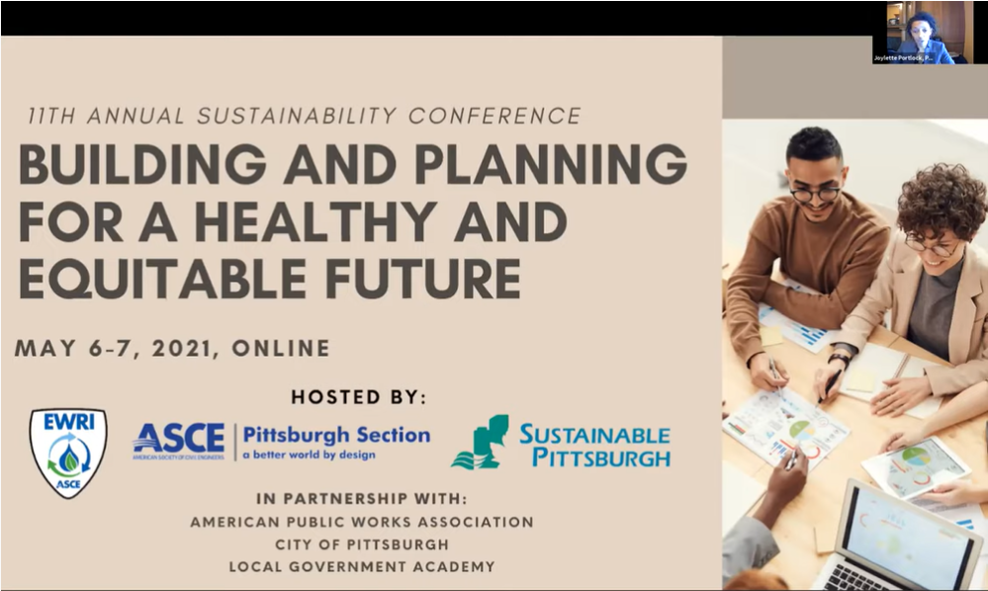
Metro21 Attends 11th Annual Sustainability Conference
Metro21 attended the 11th Annual Sustainability Conference, "Building and Planning for an Equitable and Healthy Future," hosted by Sustainable Pittsburgh, American Society of Civil Engineers (Pittsburgh Section), and Environmental and Water Resources Institute (Pittsburgh Chapter), in partnership with American Public Works Association, City of Pittsburgh, and Local Government Academy.
Watch day one of the conference here and day two of the conference here.
Key takeaways from the conference are:
“On the Front Line” with Carol Haddock - Director, Houston Public Works Public Works
Challenges
Weather
- 2017 Hurricane Harvey: 2 of the wastewater plants were under water
- They were both annexed into the city from municipal utility districts
- Some of 39 wastewater plants in Houston- this is not the right number. Is it 12? 8?
- I don’t believe this will be a one-time event.
- We have a lot of people in harm’s way.
- 2019 Moving toward a drought, then 10 days later over 44 inches of rainfall in a tropical storm
- Winter storm Uri- below freezing, power outages
- Had to adjust the chemical feeds to keep water plants functioning, lost half of the capacity
- Unlike hurricanes, sister cities could not send help. Not in the state of Texas or Louisiana able to send mutual aid.
- Texas infrastructure was not designed for extreme cold, extreme weather
- Moving toward resilience mindset, challenge yourself with goals that might seem unattainable- but they are necessary.
- Post hurricane operation and post winter storm of operation are different needs.
- Need people inside organization and inside city to buy-in to doing things differently than in the past
Staffing
- So much of Houston staff is ready to retire. How do we transition?
Compliance with Aging Infrastructure
- SSO consent decree just filed with court
- Tightening water quality standards
- Balancing growth with conservation
- Need to use our resources more wisely
Pittsburgh’s Climate Adaption Analysis with Grant Ervin - Chief Resilience Officer and Assistant Director for the Department of City Planning, Pittsburgh
- In Pittsburgh, impactful to adopt United Nations 17 SDGs: lens to shape municipals policies and investments. Critical engagement with the topic of equity.
- Developed equity indicators.
- Pro-active Risk Management Strategy is critical
- Increasing rain in Pittsburgh. 311 Map data shows impact of flooding. (2015, 2016, 2019)
- Landslides across the city of Pittsburgh has a huge impact on the budget.
Integrating Planning, Budgeting, and Climate
- Mapping and adaption scenario analysis for land use
- Energy master plan – joint infrastructure planning for next ~20 years
- Climate and priority-based budgeting
- Financial procurements- insurance and pensions
Carolyn Kousky - Executive Director – Wharton Risk Center, University of Pennsylvania
- Costs of global warming
- Indirect vs. direct costs of disasters
- Direct: housing damage, human injury, etc.
- Indirect: changes in housing availability, time and money preparing for next disaster
- Govt offers loans to survivors of disasters
- Indirect vs. direct costs of disasters
- Gaps in assistance after a disaster
- Between short term aid and long-term reparations
- Liquidity gap between these two funding zones
- CDBG-DR Grants from the government often take as much as two years for funding to reach a region.
- Inclusive Insurance: any program or insurance coverage offered to those who previously were locked out of those opportunities
- Parametric Insurance
- Indemnity Insurance i.e. home, auto, etc.
How to Create Transformational Change with Howard Neukrug
- How do we adapt water policies, systems, and practices to protect public health and the environment while still being sustainable and equitable?
- Many challenges, the biggest being the $2 to $6 billion investment of PWSA and ALCOSAN, so money might not be there for all projects.
- Currently, water systems in the area are vulnerable, and we need to protect the region’s water resources.
- There is no definite timeline to achieve swimmable, fishable, drinkable, accessible, attractive, just, and safe water.
- Focus on networking and coordination to actually get people on board with plans for clean water, and reach out to the public.
- The EPA is not as prominent in Pittsburgh as it is in Philadelphia.
- Wants to create a water network for Southwestern Pennsylvania to connect water stakeholders to actually make genuine change.
- The Southwestern PA Water Leadership Incubator Program was a first step to get people interested in water resources.
- In a Digital Workshop for Water Leaders in Spring 2021, they discussed how to make water less expensive and more accessible but safe for people.
- To adapt to disruptive climate changes, we must disrupt our current systems to make them better.
- A major part of starting change is making allies who are interested in the same mission you are.
- Explained it takes 2 years to know who friends and allies were.
- Stopping floods and sewage overflows requires more green space which lets plants absorb the water instead of letting it flow into the system.
- It is important to treat rainwater as a commodity instead of waste.
- Integrated watershed management plans include many factors including regulatory agencies, local agencies, utilities, etc.
- Localized bottom-up reinvention is sometimes the key to creating true, radical change.
- Transdisciplinary approaches help people both with training and with solving problems.
- Partnering with environmental advocacy groups was a major factor to help create change.
- Working with environmental advocates helped get EPA approval.
- Real change only happens one step at a time, and change impacts people.
- Equity comes in how you help people who cannot afford a large bill and targeting helping them.
